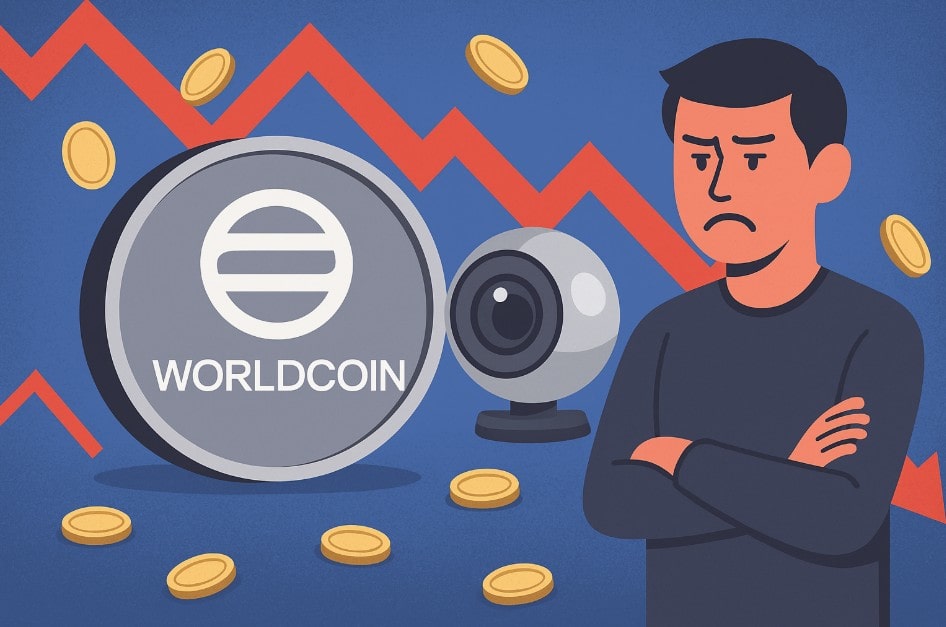In July 2023, Sam Altman stood behind Worldcoin as one of the boldest bets in crypto. It was pitched as a new identity layer for the internet, a way to verify that someone is human in an age of deepfakes and AI bots. To participate, users would simply have to let a silver “Orb” scan their irises in exchange for World ID and some WLD tokens. The pitch was simple. The implications, enormous.
Two years later, the excitement is evaporating.
A Quiet Descent
Worldcoin’s token (WLD) debuted with a wave of enthusiasm and big-name backers. Since peaking at $11.74 in March 2024, it has plunged over 90% and trades under $1 as of July 2025. On Reddit, users frequently complain about login issues and the token’s decline. One user asked, “Why did the coin go from $11 last year to 86 cents today?”.
The user numbers may look decent, over 10 million sign ups but that figure hides a more sobering truth: activity is low and interest is waning. Even Worldcoin’s biggest promise, its biometric World ID, has failed to show clear utility.
And while Altman’s name is still attached, his attention seems to have shifted.
Where’s Altman Now?
Sam Altman’s star has risen rapidly through OpenAI. Between ChatGPT and navigating boardroom drama, his energy has been focused squarely on AI. While Worldcoin was his brainchild, his role today feels more honorary than hands-on.
He no longer promotes the project on major stages. His social feeds barely mention it. If Worldcoin was meant to complement a future where AI takes over the labor market, it’s now unclear if he’s still steering the ship – or is it mainly co-founder Alex Blania calling the shots?
Regulatory Walls Closing In
Worldcoin has faced escalating legal pressure. Spain and Germany have ordered the deletion of collected biometric data, citing breaches of data privacy laws. In Kenya, operations were suspended and local courts ruled against further iris collection. Critics say the company preyed on economically vulnerable communities with little understanding of what they were giving up.
The defense from Worldcoin has been predictable: biometric data is stored securely, everything is opt-in, and the goal is inclusion. But that’s done little to ease the growing skepticism from global regulators and human rights advocates.
Still Searching for a Use Case
Even beyond the ethical questions and legal battles, Worldcoin’s deeper problem is simpler, no one seems to need it.
World ID was positioned as a solution for verifying humanness in a world flooded with bots. But the use cases haven’t materialized. Outside of a few experiments with login systems, World ID is a solution still waiting for its problem.
Meanwhile, stablecoins like USDC and utility protocols like Ethereum continue to grow quietly by actually solving payment and infrastructure problems.
As Edward Snowden warned in 2021:
This looks like it produces a global (hash) database of people’s iris scans (for ‘fairness’), and waves away the implications by saying ‘we deleted the scans!’ … Don’t catalogue eyeballs.
@Snowden on Twitter
A Glorified Data Grab?
For critics, Worldcoin was always more about control than innovation – a Trojan horse for biometric surveillance wrapped in crypto ideology. While it never required users to give up identities beyond iris scans, many argue that the data collection is inherently exploitative. Especially when conducted in countries with less stringent oversight.
There’s also the growing perception that Worldcoin was never really about “banking the unbanked” or delivering universal basic income. Instead, it looks more like a vanity project for crypto’s elite. The hype has cooled, the token has tanked, and Sam Altman is elsewhere, chasing larger ambitions in AI.
